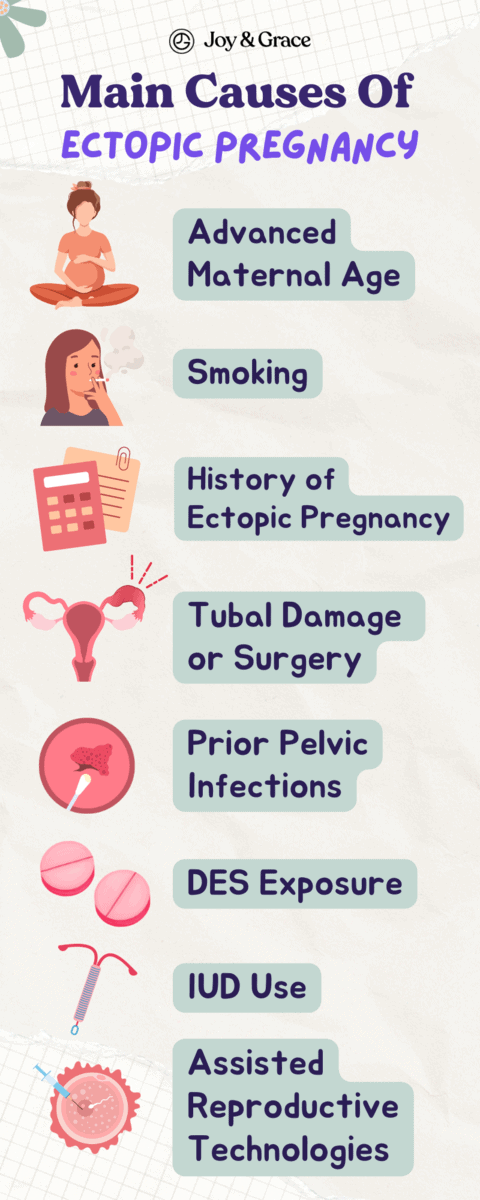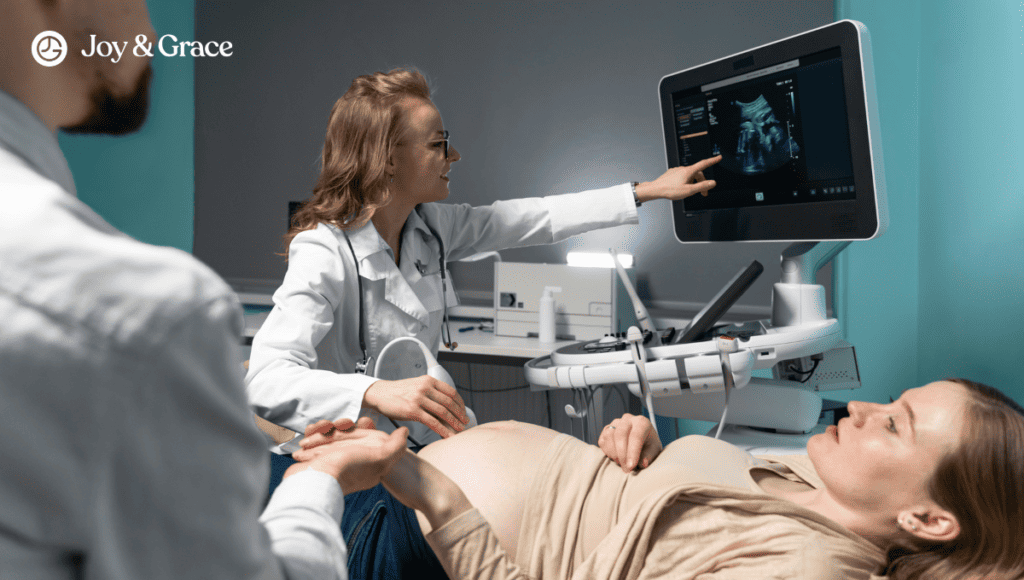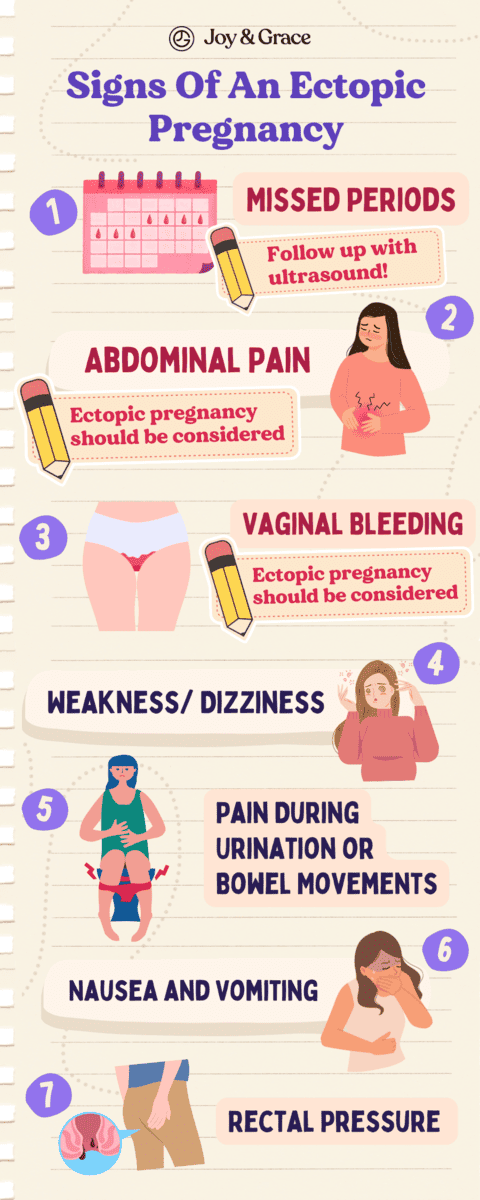Every expecting mother can attest to pregnancy's strange and often discomforting sensations. However, when it comes to shoulder pain, it can be more than just a simple ache.
Shoulder pain is one of the most important but rarely talked about signs of an ectopic pregnancy, which can be dangerous.
This guide will shed light on the mysterious link between shoulder pain and ectopic pregnancies. We explore everything, from its causes to how it feels.
Can Ectopic Pregnancy Cause Neck And Shoulder Pain?
Ectopic pregnancy can potentially cause pain in the shoulder and, in extremely rare cases, the neck. Up to 20% of women with ectopic pregnancies experience pain at the tip of their shoulders. There’s one thing that is important to note, however:
Vaginal bleeding and abdominal pain are almost always present along with this shoulder pain.
Shoulder pain, without any other accompanying symptoms, is extremely rare in ectopic pregnancies.
So, if you’ve just found out you’re pregnant through a pregnancy test, lay your worries to rest; shoulder pain alone does not equal an ectopic pregnancy.
On the other hand, if you're sexually active and unsure if your shoulder pain is coinciding with normal menstrual bleeding and cramps, we'd suggest carefully monitoring your symptoms.
While similar to symptoms from a regular period, the pain and bleeding from an ectopic pregnancy are typically more severe. The quality of the pain also differs. Ectopic pregnancy pain tends to be a persistent, dull, or sharp ache rather than cramping.
Track the timing, length, and severity of any bleeding, as well as the nature of any abdominal pain.
Even if your symptoms seem potentially menstrual, do not hesitate to speak with your doctor. Identifying any underlying problems early is always best.
This is not an ideal place for the baby to develop and can cause severe problems for the mother. Ectopic pregnancies occur in 1 to 2% of pregnancies. However, for women who have had assisted pregnancies, such as in vitro fertilization (IVF), the incidence is 2–5%.
There are two types of ectopic pregnancy:
- Tubal Pregnancy
Imagine the fallopian tubes as tunnels that connect the ovaries to the uterus. In a tubal ectopic pregnancy, a fertilized egg gets stuck and grows inside one of these tubes instead of the uterus. This is dangerous because the tube is not built to hold a growing baby.
- Non-Tubal Ectopic Pregnancy
Sometimes, a fertilized egg doesn't get stuck in a fallopian tube. Instead, it attaches and grows in other places outside the uterus. This could be places like the ovaries, cervix, or even the belly. Just like in a tubal ectopic pregnancy, this is risky and can cause health problems for the mother.
A study showed tubal ectopic pregnancies were more likely to present with shoulder tip pain. So how does an ectopic pregnancy lead to shoulder pain? Let’s dive deeper.
What Is The Main Cause Of Ectopic Pregnancy?
As mentioned earlier, an ectopic pregnancy happens when a fertilized egg gets stuck in the fallopian tubes. The fallopian tubes have smooth muscles and hair-like structures called cilia that help the egg move.
Inflammation and damage to the fallopian tubes can stop them from working properly, trapping the fertilizing egg. In addition to trapping the egg, inflammation promotes mechanisms that help egg implantation into the fallopian tube, ultimately leading to an ectopic pregnancy. Ectopic pregnancies can also occur in the following areas:
- Cervix
- Abdomen
- Within the muscles of the uterus

The following risk factors can increase your chances of having an ectopic pregnancy:
- Advanced Maternal Age
Women of all ages have an equal chance of experiencing the joy of pregnancy. However, as we grow older, our bodies change in ways that may present extra challenges. For some women over 35, the fallopian tubes can become less efficient, potentially increasing the risk of an ectopic pregnancy.
- Smoking
Smoking increases the risk of an ectopic pregnancy and can also affect the movement of the embryo.
- History of Ectopic Pregnancy
If you've had an ectopic pregnancy before, you’re at greater risk of having another one.
- Tubal Damage or Surgery
If the fallopian tubes are damaged or if you have had surgery on your fallopian tubes, the risk increases.
- Prior Pelvic Infections
Infections in the pelvic area can lead to tube damage and increase the risk.
- DES Exposure
Exposure to a medication called DES (diethylstilbestrol) can increase the risk.
- IUD Use
Using an intrauterine device (IUD) for birth control might slightly increase the risk.
- Assisted Reproductive Technologies
Techniques like in vitro fertilization (IVF) can raise the risk of ectopic pregnancy.
Can I Have Referred Pain To My Shoulder From An Ectopic Pregnancy?

Yes! In fact, referred pain is the main cause of shoulder pain during an ectopic pregnancy.
Shoulder pain is mainly due to internal bleeding from a leaking or ruptured ectopic pregnancy.
This bleeding can irritate the diaphragm. The diaphragm is the muscle separating your chest from your abdomen. The diaphragm and the tips of your shoulders share nerve connections, causing referred pain.
What Nerve Causes Shoulder Pain In Ectopic Pregnancy?

The nerve associated with shoulder pain in ectopic pregnancy is called the phrenic nerve.
The phrenic nerve largely enables signaling between the cervical (neck) region and the diaphragm. However, the nerve can also send signals to and from the shoulder area.
If there is enough bleeding in the abdominal cavity to reach the diaphragm, it can stimulate the phrenic nerve, leading to referred pain in the shoulder area.
Hence, the interconnection of the phrenic nerve may explain why you may experience shoulder pain during an ectopic pregnancy.
Further details, if you’re interested:
The phrenic nerve originates from the C3-C5 nerves. These nerves form “dermatomes” from your jaw down to your neck and shoulders. Dermatomes are like zones in your skin that are connected to specific nerves in your spine. If a nerve or its connections get irritated, it causes pain or sensations in the corresponding dermatome. This is the main mechanism behind referred pain.
What Does Shoulder Pain From An Ectopic Pregnancy Feel Like?
The characteristics of shoulder pain in an ectopic pregnancy can vary from person to person. Here’s what it may feel like:
- Sharp or cramp-like pain in the tip of the shoulder
- Pain might be more noticeable when lying down
- The pain could also be described as a dull ache or stabbing sensation
- The pain may come and go or persist over time.
The intensity can also vary. It may start as mild pain and gradually increase in severity as more blood irritates the diaphragm. It can also start as a sudden, severe pain if the ectopic pregnancy ruptures.
While shoulder pain can be a symptom of an ectopic pregnancy, it rarely occurs without vaginal bleeding and abdominal pain. So, just because you have shoulder pain, especially early in your pregnancy, doesn't mean you have an ectopic pregnancy.
Where Is The Shoulder Pain Located With Ectopic Pregnancy Symptoms?
As mentioned earlier, the pain is usually located at the tip of the shoulder. The "shoulder tip" refers to the area at the top of the shoulder, near the outer edge where the shoulder meets the upper arm. (We have a comprehensive guide for "shoulder tip" pain here if you're interested in reading further.)
The pain usually occurs on the same side of the ectopic pregnancy. So if you have an ectopic pregnancy in your right fallopian tube, you may have referred pain to your right shoulder.
Does Ectopic Pregnancy Cause Pain In Both Shoulders?
The shoulder pain associated with an ectopic pregnancy is usually felt on one side. As mentioned above, the referred pain is typically experienced on the same side as the affected fallopian tube. However, sometimes it can also be felt on both shoulders.
When Does Shoulder Pain Start In Ectopic Pregnancy?
Shoulder pain associated with an ectopic pregnancy can appear as early as the first few weeks of the first trimester. Symptoms of an ectopic pregnancy can appear as early as four weeks of pregnancy, up to twelve weeks or more.
There are, of course, many other possible causes of shoulder pain. Experiencing it in early pregnancy does not definitively indicate an ectopic pregnancy.
Does Ectopic Pregnancy Pain In The Shoulder Come Only When Touched?
The shoulder pain from an ectopic pregnancy is not usually triggered by touch. In fact, for many women, the pain can be consistent, only worsening upon movement or when lying down.
Can Shoulder Pain Also Occur During Normal Pregnancy?

Yes, shoulder pain can also occur during a normal pregnancy. This discomfort is usually due to a woman's body's natural changes during this period.
Expansion of the rib cage to accommodate the growing baby and postural changes can lead to pain in the neck and shoulders. Hormonal changes seen in pregnancy can also cause shoulder and neck pain.
Although not common, uterine rupture can also cause shoulder pain. Uterine rupture is when the muscular wall of the uterus tears. This extremely rare complication usually occurs during labor in women who have had previous cesarean deliveries. Similar to an ectopic pregnancy, bleeding from a uterine rupture can cause referred pain to the shoulder.
For women who have had one previous cesarean delivery, the chance of their uterus rupturing is about 1%. But for women with more than one previous cesarean delivery, the chance goes up to around 3.9%.
How Do I Know That My Pregnancy Is Normal And Not Ectopic?

In order to find out whether your pregnancy is normal or an ectopic pregnancy, you have to see a healthcare professional to get a proper evaluation. Some common steps in diagnosing an ectopic pregnancy include:
Ultrasound
Transvaginal ultrasound is the most important diagnostic tool. It involves inserting a small ultrasound probe into the vagina to get a clearer view of the reproductive organs. This can help visualize whether the pregnancy is in the uterus or outside.
Medical History and Symptoms
Your healthcare provider will ask about your medical history and any symptoms you're experiencing. They will also ask about your menstrual periods and any previous illnesses, pregnancies, or surgeries.
Physical Examination
Your healthcare provider will perform a pelvic exam to check for any tenderness, masses, or abnormalities in the pelvic region. They will take your blood pressure and heart rate in case you have shock from a ruptured ectopic pregnancy.
Blood Tests
A blood test to measure the hormone hCG levels (human chorionic gonadotropin) is usually done. In a healthy pregnancy, hCG levels increase over time. Abnormally slow-rising or plateauing hCG levels can be indicative of an ectopic pregnancy. In women with ectopic pregnancies, hCG levels are usually lower.
Serial hCG Monitoring
If there's suspicion of an ectopic pregnancy, your healthcare provider might order multiple hCG blood tests over a period of a few days. This is to track how pregnancy hormone levels are changing.
Additional Imaging
If the diagnosis remains uncertain, other imaging techniques might be used to view the pelvic region better. This can include:
- MRI
- CT Scans
It's important to note that early diagnosis and treatment of an ectopic pregnancy are crucial. This can prevent serious complications such as fallopian tube rupture and internal bleeding.
What Are The Three Signs Of An Ectopic Pregnancy?

There are more than three signs that point to an ectopic pregnancy.
An ectopic pregnancy usually has distinct symptoms that set it apart from a normal pregnancy.
Aside from shoulder pain (which is found in 20% of patients along with abdominal pain), here are signs and symptoms of an ectopic pregnancy to be aware of:
- Missed Periods
Theoretically, a missed period could indicate a potential pregnancy, which may or may not be ectopic. Not very helpful, we know. Doctors follow up on missed periods or a positive pregnancy test with an ultrasound scan to make sure that the implantation is indeed inside the uterus.
- Abdominal Pain
Doctors are advised to consider ectopic pregnancy as a diagnosis for any woman of childbearing age with abdominal pain.
This is often the most notable symptom. The pain might start as a mild cramping sensation and then progress to sharp, severe, and persistent pain. The pain is usually located on one side of the abdomen.
- Vaginal Bleeding
Doctors are advised to consider ectopic pregnancy as a diagnosis for any woman of childbearing age with vaginal bleeding.
That’s especially true for women who are unsure if they’re pregnant. One common scenario is a woman who hasn't had a period in more than four weeks and is now suddenly bleeding.
Light to heavy bleeding that might be different from a normal menstrual period. Spots or a dark brown discharge might be present along with the bleeding.
- Weakness or DizzinessInternal bleeding resulting from a ruptured ectopic pregnancy can lead to:
- Lightheadedness
- Fainting
- General weakness
- Pain During Urination or Bowel Movements
Pain can occur when pressure is applied to the abdominal area during urination or bowel movements.
- Nausea and Vomiting
Some women might experience nausea or vomiting. These symptoms are often due to hormonal changes or irritation caused by the ectopic pregnancy. However, normal pregnancies can cause these symptoms too. Another normal pregnancy symptom of an ectopic pregnancy is breast tenderness.
- Rectal Pressure
If the ectopic pregnancy is pressing on the rectum, it might cause discomfort or pressure in the rectal area.
Remember, an ectopic pregnancy can be life-threatening if not diagnosed early. It's vital to understand the symptoms and contact a healthcare professional if you suspect this condition.
Is Ectopic Pregnancy Safe?
The question has a direct answer. No, it is not safe for both the mother and the embryo.
An ectopic pregnancy, by nature, carries certain risks and could potentially be life-threatening. Since the tubes can't support a growing pregnancy, the consequences usually result in rupturing. A ruptured ectopic pregnancy can lead to severe pain and bleeding. If left untreated, it can also lead to shock.
Around 20% of women with ectopic pregnancies will be in shock upon visiting the doctor. Shock is a medical condition in which the body's vital organs and tissues do not receive enough blood flow and oxygen to function properly. Acute blood loss is frequently the cause of shock in ectopic pregnancy cases.
Can You Have An Ectopic Pregnancy With Only Shoulder Pain?
Shoulder pain alone is not enough to confirm a suspicion of an ectopic pregnancy.
Ectopic pregnancies typically present with a combination of symptoms, including:
- Abdominal or pelvic pain
- Vaginal bleeding
- Shoulder pain
If you have shoulder pain and suspect an ectopic pregnancy, it's important to seek medical care immediately.
However, it's also important to consider other potential causes of shoulder pain, such as:
- Muscle strain
- Joint issues
- Unrelated medical conditions
Remember, only a medical professional can provide an accurate diagnosis based on your medical history. If you're concerned about any symptoms you're experiencing, it's always best to consult with a healthcare provider.
What Can I Do To Relieve Shoulder Pain From Ectopic Pregnancy?

As much as we want to provide you with some simple remedies for your pain, ectopic pregnancy is a medical emergency requiring immediate medical attention.
Attempting to relieve the shoulder pain associated with an ectopic pregnancy on your own is not recommended. Shoulder pain in the context of an ectopic pregnancy can be a sign of internal bleeding due to rupture.
It's important to reemphasize that an ectopic pregnancy requires immediate medical attention. If you suspect you have an ectopic pregnancy, you should seek medical help without delay.
How Is An Ectopic Pregnancy Treated?
The primary goal of treating an ectopic pregnancy is to prevent the rupture and safeguard the person's health. The treatment approach can vary based on factors such as:
- The size of the ectopic pregnancy
- The location
- The individual's overall health
- Whether the pregnancy has already ruptured
Common treatment options include:
Medication
If the ectopic pregnancy is detected early and hasn't ruptured, a medication called methotrexate can be used. Methotrexate stops the growth of the pregnancy and allows the body to absorb it naturally over time. Regular blood tests and ultrasound monitoring are necessary to ensure effective treatment.
However, you can’t take methotrexate if you have:
- Hemodynamic instability
If you’re experiencing severe bleeding or unstable blood pressure, methotrexate may not be appropriate. The drug might not act quickly enough to address the immediate threat to your health.
- Tubal rupture
Surgical intervention is necessary to address the internal bleeding if the fallopian tube has already ruptured. Methotrexate may not be effective in this situation.
- Elevated hCG levels
Methotrexate is generally most effective when the levels of hCG in the blood are relatively low. High hCG levels might indicate a more advanced ectopic pregnancy. Advanced ectopic pregnancies require a different treatment approach, such as surgery.
- Significant fetal cardiac activity
If the ectopic pregnancy has progressed to the point where there is fetal heart activity, methotrexate can no longer be used. It may not effectively stop the pregnancy from advancing.
- Breastfeeding
Methotrexate can be excreted in breast milk and might harm your nursing infant. Therefore, it's typically avoided in breastfeeding mothers.
- Immunodeficiency or bone marrow suppression
Methotrexate can suppress the immune system and affect bone marrow function. If you have an existing immunodeficiency or bone marrow suppression, you might not be able to take the drug.
- Liver or kidney dysfunction
Methotrexate is metabolized and eliminated by the liver and kidneys. If these organs are not functioning properly, the drug can become toxic and cause adverse effects.
- Known sensitivity to methotrexate
If you have known hypersensitivity or allergies to methotrexate, its use is contraindicated.
Surgery
If the ectopic pregnancy has ruptured or if it's not suitable for medication treatment, surgery might be necessary. The type of surgery depends on the situation:
- Laparoscopic Surgery
Also known as minimally invasive surgery. This involves making small incisions and using a camera and specialized tools to remove the ectopic pregnancy. Since it’s minimally invasive, the procedure can preserve as much of the fallopian tube as possible.
- Laparotomy
In more severe cases, open abdominal surgery might be required to remove the affected fallopian tube or any bleeding tissue.
Expectant Management
Your healthcare provider might choose to closely monitor the situation without immediate intervention. This is done in cases where the ectopic pregnancy is small, and the individual is stable. This is generally done under careful medical supervision.
After treatment, follow-up appointments are important to monitor your recovery. This can also ensure no complications. It's also important to follow your healthcare provider's advice regarding the following:
- Rest
- Activity limitations
- Medications
Takeaway
An ectopic pregnancy is a rare but potentially life-threatening condition. Your chances of having an ectopic pregnancy can go up if you have any condition that damages your fallopian tubes.
Ectopic pregnancy can cause shoulder pain through a process called referred pain. However, shoulder pain from an ectopic pregnancy is usually accompanied by abdominal pain and vaginal bleeding. It's also crucial to keep in mind that shoulder pain can occur during healthy pregnancies and can have a variety of causes.
You can’t diagnose an ectopic pregnancy from shoulder pain alone. If you suspect you have the condition, seek medical attention right away. An ectopic pregnancy is a medical emergency requiring proper diagnosis and treatment.















